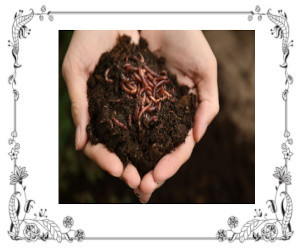It is a fact that earthworms improve garden and agricultural soils, but it’s not so well known that earthworms also can help reduce weed growth.
What is Vermicompost
Research has shown that earthworm castings, called vermicompost, improves fertility, air exchange, water absorption, drainage, and moisture-holding capacity of the soil. The possibility of earthworms having the ability to aid in the prevention of weed growth is a breakthrough for using less synthetic and harmful chemicals. Nitrogen from vermicompost will not burn plants the way synthetic fertilizers can.
How to Make Vermicompost
Vermicompost can be made indoors as well as outdoors. Vermicomposting kits are available for beginners. Otherwise bins and worms can be purchased. All that is needed is shredded newspaper for bedding and vegetable scraps from your kitchen to feed your earthworms.
How to Use your Vermicompost
Plants thrive on healthy soil; weeds thrive in poor soils. Vermicompost can be used as a mulch around trees, shrubs, flowers, and vegetable plants. While adding nutrients to the soil, vermicompost acts to reduce soil erosion, evaporation of moisture, and suppresses weed growth. Vermicompost also promotes a higher rate of germination and flowering, thus increasing the yields of all crops.
Vermicompost Tea
Studies show that compost teas can reduce weed growth from 30 to 40 percent when the tea is made by soaking one part compost to 3 to 4 parts water for no less than 24 hours.
According to the College of Agricultural, Consumer, and Environmental Science at New Mexico State University, vermicompost contains 5 to 11 times more nitrogen, phosphorus, and potassium than the soil. As a tea, these substances are readily made available to the plants as the plants uptake the nutrient-infused water.
Vermicompost tea used as a spray helps to suppress foliar diseases. Some gardeners even claim that the tea reduces powdery mildew.
Vermicompost tea concentrates can be purchased for those who would rather not make their own.
Author Marilyn Pokorney
Copyright Marilyn Pokorney 2019




